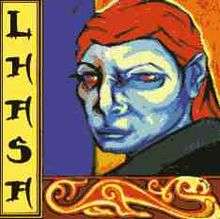La Llorona (album)
For the character in Mexican legend, see La Llorona.
| La Llorona | ||||
|---|---|---|---|---|
 | ||||
| Studio album by Lhasa de Sela | ||||
| Released | 1997 | |||
| Length | 44:16 | |||
| Label | Audiogram (Canada), Atlantic (USA) | |||
| Lhasa de Sela chronology | ||||
| ||||
| Professional ratings | |
|---|---|
| Review scores | |
| Source | Rating |
| Allmusic | |
La Llorona is the first album by Canadian singer Lhasa de Sela, released in 1997 in Canada and 1998 elsewhere.
Track listing
- Tracks 1 to 4, 9 and 10 written by Lhasa de Sela and Yves Desrosiers
- Track 7 written by Lhasa, Alex de Sela and Desrosiers
- Tracks 5, 6 and 8 are traditional, arranged by Lhasa and Desrosiers
- Track 11 written by Fernan Silva Valdez and Alberto Ginastera
| No. | Title | Length |
|---|---|---|
| 1. | "De cara a la pared" | 4:16 |
| 2. | "La Celestina" | 4:47 |
| 3. | "El desierto" | 3:53 |
| 4. | "Por eso me quedo" | 3:51 |
| 5. | "El payande" | 3:32 |
| 6. | "Los peces" | 3:51 |
| 7. | "Floricanto" | 4:10 |
| 8. | "Desdeñosa" | 4:34 |
| 9. | "El Pájaro" | 3:58 |
| 10. | "Mi vanidad" | 4:13 |
| 11. | "El árbol del olvido" | 3:11 |
Folk Legend
Alejandro Sela, Lhasa's father, received his doctorate on literature of the Spanish conquest of Mexico and taught her of the legend of La Llorona.[1] This is the folktale of the crying woman, resembled the mythological wife of Quetzalcoatl who has lost her children. For Lhasa, La Llorona comes from the omen of conquerors. Lhasa believes that the woman cried when the Spanish arrived in America to warn her native children of the doom that the conquistadors would bring to their way of life.
References
This article is issued from Wikipedia - version of the 11/5/2015. The text is available under the Creative Commons Attribution/Share Alike but additional terms may apply for the media files.